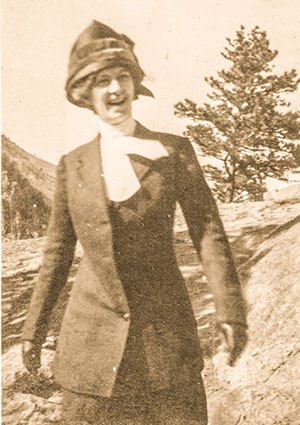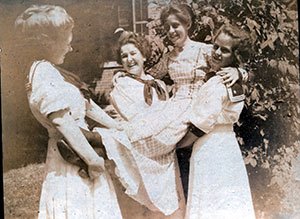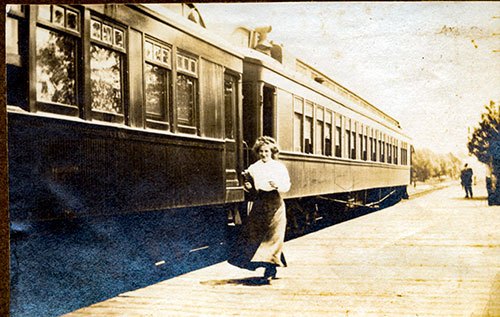Among the treasures stored in Tri Delta’s archives rests a slightly battered brown scrapbook. Despite its unassuming appearance, the content between its covers chronicles the remarkable journey of the Fraternity’s first visiting delegate, R. Louise Fitch, Knox. The unidentified photos give us a glimpse of chapter life in the early 1900s.
The Visiting Delegate
In its infancy, the Fraternity focused on the mechanics of operating the new and rapidly growing organization. Details such as organizational structure, Rituals, official jewelry, member education and the creation of The Trident were the principal subjects for consideration at the earliest Conventions. By the turn of the century, the Fraternity began to concentrate on the “care and feeding” of its collegiate chapters. At the 1902 Convention, it was R. Louise who moved “that a visiting delegate be appointed by the Grand Council to visit each chapter once in two years.”
The concept was temporarily tabled while a committee looked at the costs associated with the new and different methods of funding it. The 1904 Convention body voted to have a visiting delegate who would “be appointed by the Grand President if she herself was unable to do the job.” At the same time, a per capita fee of $.50 on both active and alliance members was levied to pay for the program. As logistics for the program were laid out, it became apparent that the inspections would be of greater value if the same person performed all of the visits.
Elizabeth Tumbleson Luetscher, Grand President, appointed R. Louise to the position in addition to her post as Editor of The Trident.
R. Louise served as visiting delegate a second time 10 years later. Her 1912 report was a comprehensive comparison of her two visits to each chapter 10 years apart and an invaluable look at growth and change in collegiate chapters across the country.
As Tri Delta grew, it became evident that one visiting delegate could not give the chapters the attention they deserved. By this time the Fraternity had designated several regional areas or provinces. To better work with chapters, province deputies were assigned as visiting delegates for their areas. When the provinces were further broken into districts, district presidents were initially given the responsibility to visit the chapters. By 1939, the district presidents were assisted by the first traveling secretary, whose role was to “gain a composite picture of all chapters and…be able to offer impartial advice to district presidents and the Executive Board.” The traveling secretary program grew and expanded to become today’s chapter development consultants.
A Visit from Miss Fitch
During her first term as visiting delegate, R. Louise inspected 22 active chapters and was present for a chapter installation. The first visit was to Upsilon Chapter at Northwestern in May 1905; the last was the newly installed Alpha Xi at Randolph-Macon that she concluded on May 25, 1906. She described her visits in her report to the 1906 Convention: “As far as possible, four days were spent with each chapter. In that time, at each school, some social affair, tea, reception, card party or something of the kind was given at which I was enabled to meet the members of all
Sororities in the institution. Dinners, drives, theatres, dances, receptions, chafing dish spreads, luncheons some or all were given at each chapter to enable me to meet all active members and alumnae, and in some cases gentlemen friends of each chapter, socially. During each visit, a regular chapter meeting and also a regular Alliance [alumnae chapter] meeting were held and regular business conducted in the ordinary way. Every chapter book was examined, plans and policy of chapter, characteristics, and strengths of [other sororities on campus], house finances and methods of meeting bills for house or room…were discussed.”
A colleague later wrote of her, “Many chapters were at first intimidated by her arrival, often spending the preceding weeks in a flurry of cleaning and organizing in anticipation of her visit. After she arrived, her shrewd eyes saw far more than the chapter realized and she developed a warm relationship with each one she visited, even those she had to discipline. She left the chapters showered with hugs and kisses, and along with her notes, a magazine or two and a box of chocolates under her arm, gifts to ‘Our Louise.’”
In addition to visiting the collegiate chapters, R. Louise met with a number of local Panhellenic groups where she shared “what ideas I had gathered regarding rules and condition in other schools.” She also met the Dean of Women at each school “where such an official exists at her request and talked over conditions among the college, the college women and how the sororities might be of service to college authorities in bettering conditions.”
R. Louise encouraged each chapter to build strong relationships on campus, particularly with other sororities. She found that “in every instance, rival fraternities were delightfully cordial and hospitable. At Madison, Kappa Kappa Gamma, at Lincoln, Kappa Alpha Theta, and at Berkeley, Kappa Alpha Theta sent an invitation to dinner at the chapter house, each of which was happily accepted.” She also writes, “a number of Grand Officers of Kappa Alpha Theta, Kappa Kappa Gamma, Delta Gamma, and Chi Omega were met and the little excha nge of experiences was exceedingly enjoyable.”
nge of experiences was exceedingly enjoyable.”
The photos in her scrapbook reflect the warm relationship she developed with each chapter she visited. There are formally posed group shots, picnics at local lakes and beaches, and informal shots of members clowning around with their visiting delegate. Dance cards, place cards, and dinner menus are mementos of the social occasions R. Louise shared with the chapters. Her experiences with the chapters carried over in new features she included in The Trident that provided a closer look at chapter life, or as she put it, “enabling Tri Delta to become acquainted with itself.”
Her closing thoughts in her 1906 report likely resonate with today’s chapter development consultants:
“The task of visiting the chapters is not a light one. The social side alone is wearing, though pleasant, and the energy necessary to judge quickly and fairly, ferret out true conditions, be ready with solutions for any kind of problem, to go with but little or no sleep, catch trains at any hour of day or night, etc. —this energy is incalculable. But if, as is hoped, the greater possibilities of usefulness for fraternity members is realized, if system and order prevail, if more enthusiasm is aroused and interest increased, then the first visiting delegate will feel that the discomfiture and hard work are more than repaid.”

